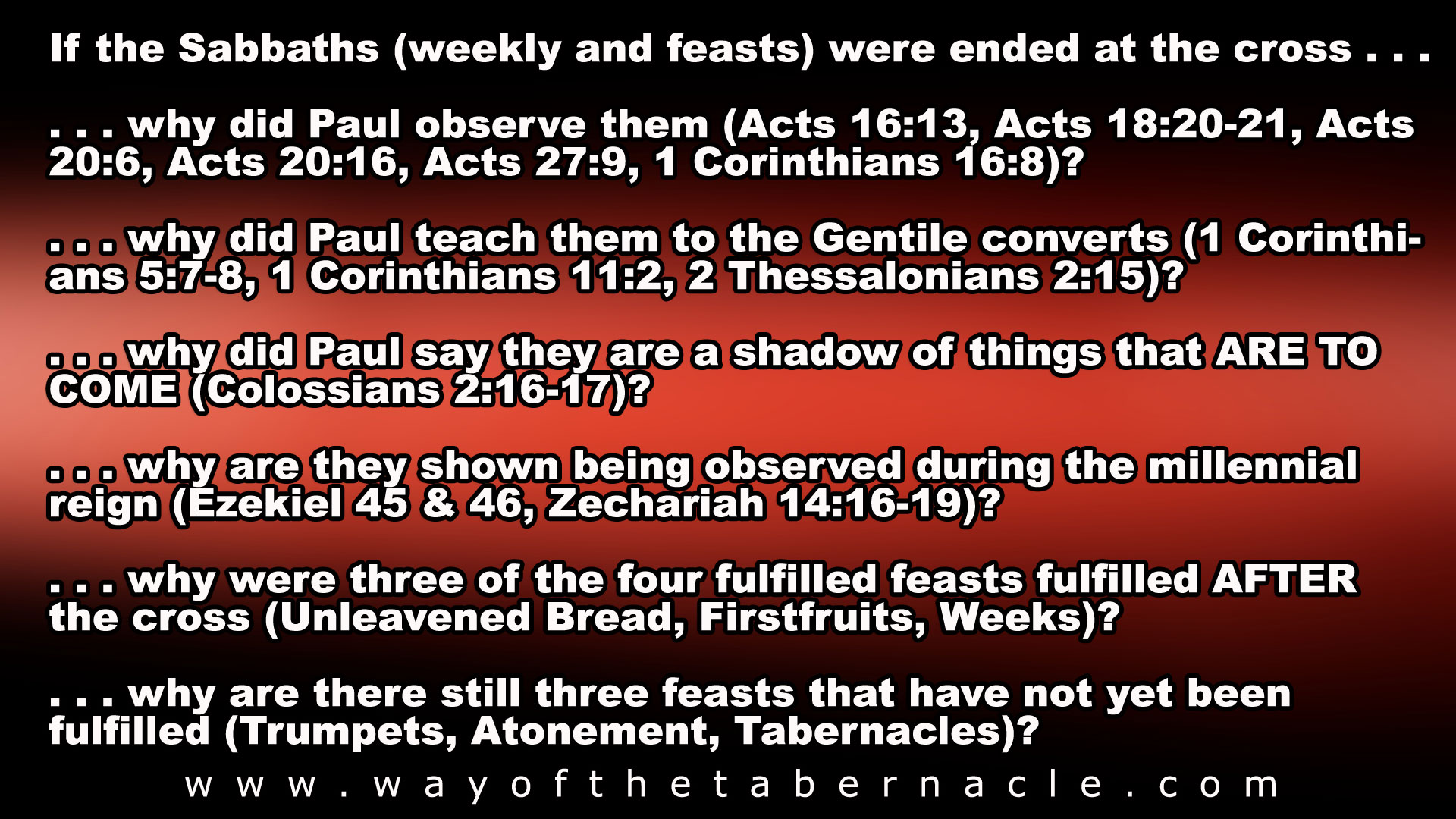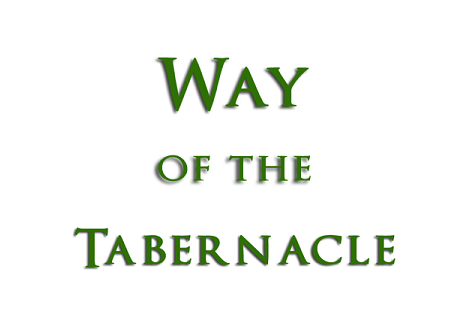SATURDAY OR SUNDAY? DOES IT EVEN MATTER?
For five decades, I was a formally-educated churchian, and there were some things that were just so fundamentally believed to be true, that I never bothered to question them seriously. One of those things was the issue of the Sabbath, and what the scriptures actually state about it—is it still “a thing,” did the Creator authorize a change from Saturday to Sunday, and does it even matter which day of the week we gather for fellowship and spiritual instruction? Like other spiritual truths I have learned in recent years that are contrary to what I had believed for so long, the scriptures are not silent on this matter, and what much of the “church” teaches cannot withstand true scriptural scrutiny (in other words, it's false).
But, these things will likely only matter to those who are interested in what the Father desires. If one places what his “church” teaches above what the Creator has said, then this issue will probably not matter one bit, and seeking to know His will in this will be falsely labeled as “legalism,” or even “heresy.” But, herein, it will be shown that scripture is definitive on the matter, and anyone who is actually interested in truth will not be able to defend the error that is so commonly taught and believed.
In John 4:24, Christ said that “Yah is spirit, and they that worship Him must do so in spirit and in truth.” What does that mean? Well, looking at the ten commandments, we can see how He desires His children to relate to Him (first four commands) and to others (last six commands). Love Him and love your neighbor.
But, how, specifically, does He says He wants His children to relate to Him? Let's look at those commands that deal with relating to Him:
1. You shall have no other gods before Me.
2. You shall not make any graven images.
3. You shall not take My name in vain.
4. Remember the Sabbath day to keep it holy.
Most folks in the “church” think they have no real problem with the first three (although, the Roman Catholic Church definitely has issues with #2). But, numbers 3 and 4 are really ignored by most of the “church,” largely out of ignorance of what they even mean. While we're not really going to address the third commandment, just know that it doesn't have anything to do with saying things like “G*d d*mn,” as the Creator's name is not “God.” Taking His name in vain is more about attaching Him to what is false, worthless, or idolatrous, which is actually what celebrating the Roman Catholic holydays of Christ-mass and Easter/Ishtar do.
And, that is actually related to the fourth commandment, since the true days that are ordained by the Father are all called His “Sabbaths.” His Son was born, died, and rose again all on specific Sabbaths (Tabernacles, Passover, and Firstfruits).
But, the fourth commandment speaks specifically of the weekly Sabbath—the one day per week that is set aside for rest and assembling together with other believers (Leviticus 23:3). This commandment is rooted in Creation (Genesis 2:2, Exodus 20:11), and is part of the Sabbath system that Yah calls His (Ezekiel 22:26).
During my five decades in the “church,” I can recall four different excuses for how those who assemble together on Sunday justify that choice, and ignore what scripture states about Saturday. Those excuses are all invalid, and demonstrate a complete lack of spiritual understanding. Let's examine each one in detail.
Excuse #1: The Sabbath observance was part of the law, and it no longer applies.
First, in Ezekiel 22:26, referenced above, it is clear that Yah sees His laws and His Sabbaths as two different things. So, stating that it is nullified because it was part of the law is not a valid argument. Moreover, claiming that one is not under the law is not the same as saying that the law no longer exists. Christ fulfilled the law, He didn't abolish it. His sacrifice removed the penalty and the details of the law, but the instruction of it still remains.
Will murder send someone to hell? No. How about adultery? No. The same is true for lying and stealing. There is only one sin that sends anybody to hell, and that is unbelief. BUT, does that mean that those who are indwelt by the Holy Spirit are encouraged to start murdering or committing adultery? Of course not, as that would still be rebelling against specific commandments of Yah. So, if what the Creator commanded about murder, adultery, lying, and stealing is still relevant, why is it that what He said about the weekly Sabbath is now irrelevant? Surely, if He had changed His mind on that, either His Son would have mentioned it while He was here, or the apostles would have taught about the change in their epistles. There are no such admonitions in scripture.
In Leviticus 23:3, we see that the weekly Sabbath was not only for rest, but for “holy convocation,” which just means it is a day for believers to assemble together for spiritual edification. In the days of the New Testament, it was the day that the believers met in each others' homes for fellowship and spiritual instruction. Now, if what is claimed by many churchians is true—that the Sabbath observance has been abolished—then why do they meet together each week? What makes them even think they should meet weekly? The regularity of assembling together is directly tied to what Yah commanded about His weekly Sabbath.
Excuse #2: We now meet on Sunday because Christ rose again on Sunday.
This justification comes from a lack of understanding of the Father's traditions, which is exactly the deception that the early “christians” wanted to happen. Those early churchians hated the Jews, and wanted to separate themselves from everything the Jews practiced in their spiritual lives. Wrongly believing that the Father's traditions belonged to the Jews, rather than to the Father, the early churchians treated those traditions as if they were merely part of a religion, rather than an ordained prophetic calendar that all points directly to Messiah and events that pertain to Him and His followers.
The early churchians used the false Good Friday and Easter narrative to counterfeit the true days that memorialize the crucifixion and resurrection of Messiah. He was crucified on Passover, and He rose again on the Feast of Firstfruits—both Sabbaths ordained by the Father. One needs to understand the meaning of Firstfruits to know why Messiah's resurrection never changed the Father's desire for His children to identify with Him by honoring His weekly Sabbath.
The timing of the start of the Spring festivals was dictated by barley, even though barley and wheat are planted at the same time—the wheat harvest starts seven weeks after the barley harvest. When the barley is “abib,” which means “young ears,” and indicates that it is nearing its harvest stage, the next new moon starts the month of Nisan. That new moon originally started the month of Abib, but since the Babylonian captivity, the Jews have referred to the month as Nisan. This is the first month of the ecclesiastical (spiritual) year.
So, on the 14th day of Nisan each year is the Passover. The day started at sundown, and the Jews would celebrate the Seder in their homes that evening. The following morning (still Passover), the Passover lamb would be sacrificed at the temple, which is when Christ was crucified (it was a Wednesday that year). The next day after Passover, which was called the “preparation day,” was the Feast of Unleavened Bread, which lasts a week, but the high Sabbath is the day after Passover.
On the first day of the week (Sunday) following the weekly Sabbath (Saturday) that follows the Passover, the barley harvest began. This was obviously a work day, as it is the day they started harvesting the barley. On that day, the high priest would take a sheaf of barley from a pre-selected field, and he would present a wave offering to the Father, signifying the beginning (or firstfruits) of the harvest (Leviticus 23:10-11).
After sundown on the Saturday that followed Passover (Passover being the day Christ was crucified), it became the first day of the week. Sometime during that night, Christ rose again. We know that it was during the night because we're told that the women made their way to the tomb while it was still dark (John 20:1), but that Yahoshua the Messiah was already gone when they arrived. So, there is nothing about the dawn that is tied to His resurrection (the sunrise service is actually tied to the pagan Easter, which celebrates the resurrection of Tammuz, and is shown in Ezekiel 8:14-16). The resurrection actually occurred during the period of time we would refer to as “Saturday night,” even though, to the Jews, after sundown, it became the first day of the week.
We are told that, when Christ appeared to Mary Magdalene, He told her not to hold onto Him, because He had not yet ascended to His Father. The reason He had to ascend to His Father was that, as the new Great High Priest, it was His duty to perform the wave offering of the firstfruits of the barley harvest.
We read that there was a large group of people who had risen from the dead when Christ did, and they walked around Jerusalem, being seen by many people. These were the Old Testament saints, who are the friends of the Bridegroom (John 3:29), and these were the firstfruits wave offering that the Great High Priest Yahoshua presented to His Father. That's why He had to ascend back to His Father before coming back and appearing to many of His followers after His resurrection. His fulfillment of the Feast of Firstfruits began the spiritual barley harvest, which will continue until the bride is gathered together in the air on the fulfillment of the Feast of Trumpets.
So, Christ's resurrection on the first day of the week (during the night) has nothing to do with when His followers meet, as the day He rose again was always a work day, and remained a work day for several centuries following His resurrection. The two-day weekend was not invented until the 20th century, so, during the time of the New Testament, folks worked six days and rested/assembled one. The day of that assembling was never changed because of Christ's resurrection on the Feast of Firstfruits—signifying the beginning of the harvest, a work day.
Excuse #3: Scripture states that the NT believers assembled on Sunday.
The word “Sabbath” is used more than 65 times in the New Testament, and each time, it refers either to the seventh day of the week, or to a feast day. By contrast, the “first day of the week” is mentioned only eight times in the New Testament, and six of those are specifically about the resurrection, which occurred during the night following the weekly Sabbath. That leaves two other times in the whole of the New Testament that mention the “first day of the week.” Certainly, if the Father's desire was for His children to change the day of the week they assembled together, He would have made that clear, at least in those two passages. Let's see if that's what He did.
The first occurrence is in Acts 20:7. Often, when trying to prove false teachings, churchians will lift scriptures out of their contexts, and make them state things they don't state. So, let's make sure we understand completely what is going on in Acts 20.
Paul is traveling here, preaching the Gospel and eluding the Jews who wanted to kill him. The first bit of bad news for the false churchian narrative is that we see in verse six that Paul and the disciples still observed the feasts, as the scripture clearly states they sailed from Philippi after the days of Unleavened Bread, so they made this trip right after the Spring feasts. It took them five days to travel from Phillipi to Troas, and they stayed there in Troas for a week.
Here it is vital to understand that their days started at sundown; so, Saturday at sundown became Sunday, the first day of the week. The disciples stayed together, especially when they were traveling, and knowing that Paul was departing in the morning for Assos (Acts 20:13), they got together for a meal. Now, this was after the Sabbath, because, at sundown, it became the first day of the week (just like when Christ rose again—during the night after sundown, which we would call “Saturday night”).
The scriptures record here that Paul started preaching (spiritual instruction) to the disciples, and their discourse lasted into the wee hours. We're told that a young man named Eutychus fell asleep and fell from a third floor loft, which killed him, and that Paul resurrected him. Again, this all happened on what we would call “Saturday night.” It is nothing like what is commonly called a “Sunday worship service” here, because, after dawn on Sunday, Paul walked 24 miles to get to a ship.
Also, the mention of “breaking bread” here has nothing to do with the churchian “communion,” as that is merely a counterfeit of the Passover Seder, and there is no admonition for it to be done specifically on the first day of the week. Yahoshua said, "as often as you do it . . ." In fact, Yahoshua the Messiah's last supper took place after sundown on what we would call “Tuesday night,” but, for them, it was Wednesday.
In Acts 2:46, we see "breaking bread" mentioned as an idiom for sharing the Gospel, which the believers did by teaching the Passover Seder to the lost. So, in Acts 20:7, Paul and the disciples had gathered on the evening right after the conclusion of the weekly Sabbath (Saturday), and had a meal together, probably a Seder in which Paul expounded the doctrines of salvation in the Gospel of Yahoshua. Paul knew he was leaving from there in the morning, so he ate with them and also fed them spiritually.
There is nothing at all in this passage that even suggests that the Sabbath had been changed to the first day of the week, as that is the day Paul traveled 24 miles to a ship. Acts 20:7 occurred the night before that.
The only other mention of the first day of the week is in 1 Corinthians 16:1-2. Here, Paul is directing the believers in Corinth, as he did with those in Galatia, regarding gifts for the poor in Jerusalem, which was in the midst of a drought (Acts 11:28). This was not a matter of “passing the plate,” as is common in today's churchianity, but was an admonition to set aside gifts for the needy from the first fruits of their labors, as is taught in Proverbs 3:9.
As mentioned earlier, the barley harvest always started on the first day of the week, so it was understood with these folks that the first day of the week was a work day for them. It is when they performed their secular work for money to support themselves.
Paul told them to “lay by and store,” which means “set aside and save.” This was not a public matter, but a private one. He told them to take from the first fruits of their weekly labor, and set those gifts aside at their homes so that their representatives could go to each of their homes to gather them, and those men could accompany Paul to deliver those gifts to the needy in Jerusalem. This had nothing to do with a public collection of anything, but with privately putting something aside for the needy saints in Jerusalem.
So, neither of these passages has anything whatsoever to do with the day of rest and assembling together being changed from the Sabbath (Saturday) to the first day of the week (Sunday). The scriptures never suggest such a thing occurred.
Excuse #4: Scripture tells us there is no specific day of the week to assemble anymore.
The typical scripture that is lifted out of context for this little gem is Romans 14:5, and the lack of context is used to falsely assert that Paul taught that the Sabbaths are no longer to be observed or taught. Of course, we can see that Paul himself observed the feasts (Acts 18:21), and the feasts are part of the entire Sabbath system, which are the days the Father ordained as His, and the whole Sabbath system is about Christ (Colossians 2:17).
So, what is the proper context of Romans 14? Why is Paul talking about food, and then suddenly throwing in talk about particular days? Is it more reasonable to conclude that he is talking about related things, or unrelated things? If he is talking predominantly about food in this passage, would the days he is talking about be more likely to have something to do with food, or just any kind of day? Context dictates that the days he is talking about necessarily are related to what he is discussing about food.
He is speaking of the stronger believer versus the weaker believer, and how the stronger brother should regard the weaker brother. This was an era that Gentiles were just coming to belief in Yahoshua the Messiah out of their lives of idol worship. So, the weaker brothers were still very conscious of all the meat at the market that had been sacrificed to idols before it was sold. This is the same thing Paul discusses in 1 Corinthians 8—abstaining from meat offered to idols if the weaker brother is offended by eating it (even though, as Paul says, the stronger believer knows that idols are nothing).
Now, in the context of this discussion of eating, Paul throws in a statement about days—one man esteems some days more highly than others, while another man regards all the days alike. Paul is not speaking here of anything other than days associated with eating. He is speaking both to those who were Jews, and those who were Gentiles. Many Jews used to have a semi-fast twice a week (Luke 18:12), and some fasted in the fifth and seventh months (Zechariah 7:4-7). Paul is speaking only of those days of fasting, not about the days that the Father had ordained as His Sabbaths, for it would be ludicrous to assert that Paul said the ordained days don't matter in this passage, but then taught them everywhere else.
Romans 14, in its proper context, is speaking only of matters to do with eating and fasting, and has nothing to do with the Sabbaths. What Paul does teach about the Sabbaths is that believers are not to judge each other in what they eat or HOW they observe and honor the Sabbaths (Colossians 2:16-17). There, Paul specifically speaks of holydays, new moons, or Sabbaths—all things that are part of the Sabbath system of the Father, because the penalty and the perfection (details) of the law were nailed to the tree. So, we are no longer bound to the intricacies of observing the Sabbaths according to the written law, and are free to honor them according to our consciences.
Paul NEVER states that the Sabbaths are not to be observed, but that we are not to judge HOW other believers choose to honor them. He NEVER states that blowing off the Sabbaths for counterfeit holydays (like Christ-mass and Easter/Ishtar) is acceptable to the Father, nor does Paul, or anyone in scripture, ever state that the weekly Sabbath that the Father set apart for rest and assembling together with other believers for spiritual support and instruction was changed to another day or abolished altogether.
Constantine and his Roman cohorts (who hated the Jews) essentially created a new religion of “christianity,” which calls itself by the name of a pagan goddess, the daughter of the sun god (Circe=church), which assembles together to worship on the “venerable day of the sun,” and which celebrates holydays that are wholly tied to sun worship. The true faith was stripped of its foundations by those spiritual miscreants, and pagan practices and rituals put in their place. This counterfeit of the faith is what has led so many billions of people astray. Yes, the Father's traditions still matter, and His children are being drawn by the Spirit, and are being called out of what calls itself the “church.”
For those who maintain that the weekly Sabbath and feasts were given only to the Jews, they are actually correct, even though they don't understand why. They are likely speaking of ethnic (physical) Jews, but, in Romans 2:29, Paul tells us who the true Jew is, and it has nothing to do with anything outward, but are those whose hearts have been circumcised by the Holy Spirit. Those who maintain that the Sabbaths were given only to the descendants of Abraham are right, for as Paul tells us in Galatians 3:29, “And if you belong to Christ, then you are Abraham’s descendants, heirs according to promise.”
Who belongs to Christ? “However, you are not in the flesh but in the Spirit, if indeed the Spirit of Yah dwells in you. But if anyone does not have the Spirit of Christ, he does not belong to Him” (Romans 8:9). So, according to everything we are given in the scriptures, the Sabbaths belong to the Father, and He desires His children to identify with Him by honoring and teaching those prophetic days. And, that includes His weekly Sabbath, which is Saturday each week. Assembling on Sunday is a tradition of men, and is not the day ordained by the Father. Accordingly, one cannot worship in spirit or in truth by teaching that the first day of the week (Sunday) is the day for assembling with other believers.


Salvation
Traditions
Other Truths
But now in Yahoshua the Messiah you who formerly were far off have been brought near by the blood of Christ. For He Himself is our peace, who made both groups into one and broke down the barrier of the dividing wall, by abolishing in His flesh the enmity, which is the Law of commandments contained in ordinances, so that in Himself He might make the two into one new man, thus establishing peace, and might reconcile them both in one body to Yah through the cross, by it having put to death the enmity. Ephesians 2:13-16




